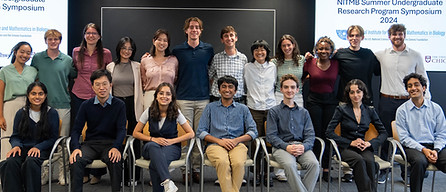Education & Training
The NSF-Simons National Institute for Theory and Mathematics in Biology invites students, faculty, and the community to engage with our dynamic education and outreach programs. From a summer undergraduate research experience to a visiting fellows program offering support for faculty at teaching-intensive institutions, as well as public lectures aimed at sparking curiosity in the broader community, there are opportunities for involvement at all levels of experience and to further learn and engage in innovation at the intersection of mathematics and biology. Our mission is to empower young scholars with the skills and intuition needed to navigate both fields throughout their academic careers, and to train experienced scientists to better bridge the gap between theory and experiment. Join us in exploring new ways to connect math and biology, solve complex problems, and inspire the next generation of interdisciplinary thinkers.


The NITMB Summer Undergraduate Research Program gives undergraduate students majoring in biology engineering, mathematics, statistics, physics, and related fields the opportunity to participate in hands-on research and professional development workshops at the interface of mathematics and biology. Over the eight week summer program, students work closely with NITMB faculty at Northwestern University and the University of Chicago on theoretical, computational, and experimental research projects that apply mathematical concepts and methodology to understanding mechanisms in biology. Workshops on science communication, scientific computing, and career opportunities round out the experience, as students become a part of the NITMB family. Participants receive a taxable stipend of approximately $4,800, and are provided housing and a meal plan. Students from minority-serving institutions, primarily-undergraduate institutions, and community colleges are especially encouraged to apply.